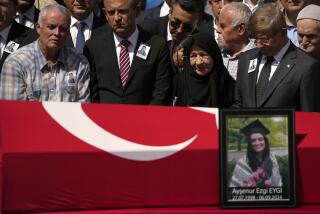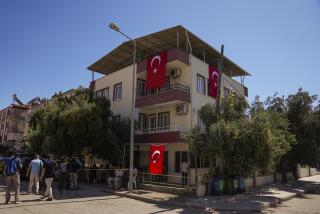Two dead in bombing outside U.S. Embassy in Turkey
BEIRUT -- A bomb, apparently set off by a suicide attacker, exploded Friday outside the heavily fortified U.S. Embassy in Ankara, Turkey, killing two people and injuring at least one other, according to media and official reports.
The identity and motive of the attacker were not immediately clear. The two dead included the assailant and a Turkish citizen working at the embassy, press reports said.
U.S. Ambassador Francis Ricciardone told reporters that a guard at the gate was killed in the 1:15 p.m. blast, and a Turkish citizen was wounded, the Associated Press reported.
There was no word of U.S. citizen casualties. Turkish reports indicated that there was no damage inside the embassy itself.
Ankara Gov. Aladdin Yuksel, who arrived at the scene, confirmed that the explosion was the result of a suicide bomber and that two people had been killed, including the attacker, and that one other person, a woman, had been injured, the Turkish press reported.
Video from the scene showed masonry blasted off a wall at the embassy entrance and a missing door, apparently blown off its hinges.
The embassy is in a heavily secured street in the center of the Turkish capital, close to the German and French embassies.
How the attacker managed to get past the first security cordon and approach the entrance of the American Embassy was not clear.
The embassy released a statement thanking “the Turkish government, the media, and members of the public for their expressions of solidarity and outrage over the incident and others for their response,” according to the website of Today’s Zaman, an English-language daily. No other details were provided.
Turkey is a staunch U.S. ally and the eastern bulwark of the North Atlantic Treaty Organization. Militant groups with various agendas and grievances have previously conducted attacks on Turkish soil.
Friday’s explosion occurs at an extremely sensitive moment in the region.
Turkey shares a long border with Syria, where a bloody, almost two-year rebellion is being fought against Syrian President Bashar Assad. Turkey has backed the Syrian opposition, allowing its territory to be used by rebel forces, and has called for Assad to step down. Ankara’s stance in Syria has drawn both strong support and fierce criticism in Turkey.
The United States, which has also called for Assad to step down, is among three NATO nations deploying Patriot missile batteries in Turkey in what the alliance calls a defensive move against a possible missile attack from Syria.
Syria and its allies have labeled the deployment a dangerous provocation.
Turkey is also involved in a decades-long war with the outlawed Kurdistan Workers’ Party in the southeast, where the nation’s ethnic Kurdish population is concentrated.
Bombings and and attacks on Turkish and Western targets have occurred previously in Turkey.
In August, a car bomb exploded near a police station in the southeastern Turkish city of Gaziantep, killing at least eight people. Authorities suspect that Kurdish militants were involved.
In 2008, gunmen reportedly linked to Al Qaeda attacked the U.S. consulate in Istanbul, Turkey, resulting in a shootout that left six people dead.
In November 2003, four truck bombs left 67 dead and hundreds wounded in attacks in Istanbul targeting a pair of synagogues, Britain-based HSBC bank and the British consulate. Turkish authorities blamed Islamic militants linked to Al Qaeda.
ALSO:
Suicide bomber kills 23 near Pakistan mosque
Egyptian liberals, Islamists join in denouncing violence
Somalia charges woman who said she was raped by troops
More to Read
Sign up for Essential California
The most important California stories and recommendations in your inbox every morning.
You may occasionally receive promotional content from the Los Angeles Times.










